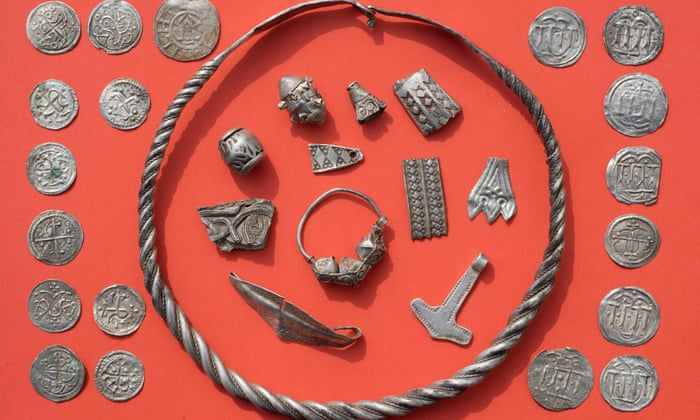Discovery by a 13-year-old and an amateur archaeologist leads to hoard linked to king who brought Christianity to Denmar.

Part of the hoard linked to Bluetooth, the Danish king who reigned from around AD958 to 986. Photograph: Stefan Sauer/AFP/Getty Images
A 13-year-old boy and an amateur archaeologist have unearthed a “significant” trove in Germany which may have belonged to the Danish king Harald Bluetooth who brought Christianity to Denmark.
René Schön and his student Luca Malaschnitschenko were looking for treasure using metal detectors in January on northern Rügen island when they chanced upon what they initially thought was a worthless piece of aluminium.
But upon closer inspection, they realised that it was a piece of silver, German media reported.
Over the weekend, the regional archaeology service began a dig covering 400 sq metres (4,300 sq ft). It has found a hoard believed to be linked to the Danish king Harald Gormsson, better known as “Harry Bluetooth”, who reigned from around AD958 to 986.
Archaeologists working on the dig on Rügen island after the find by René Schön and Luca Malaschnitschenko. Photograph: Stefan Sauer/AFP/Getty Images
Braided necklaces, pearls, brooches, a Thor’s hammer, rings and up to 600 chipped coins were found, including more than 100 that date back to Bluetooth’s era, when he ruled over what is now Denmark, northern Germany, southern Sweden and parts of Norway.
“This trove is the biggest single discovery of Bluetooth coins in the southern Baltic Sea region and is therefore of great significance,” the lead archaeologist, Michael Schirren, told national news agency DPA.
The oldest coin is a Damascus dirham dating to 714 while the most recent is a penny dating to 983.
The find suggests that the treasure may have been buried in the late 980s – also the period when Bluetooth was known to have fled to Pomerania, where he died in 987.
“We have here the rare case of a discovery that appears to corroborate historical sources,” said the archaeologist Detlef Jantzen.
Bluetooth is credited with unifying Denmark. The Viking-born king also turned his back on old Norse religion and introduced Christianity to the Nordic country.
But he was forced to flee to Pomerania after a rebellion led by his son Sven Gabelbart.
Bluetooth’s lasting legacy is found today in smartphones and laptops – the wireless Bluetooth technology is named after him, and the symbol is composed of the two runes spelling out his initials HB.












